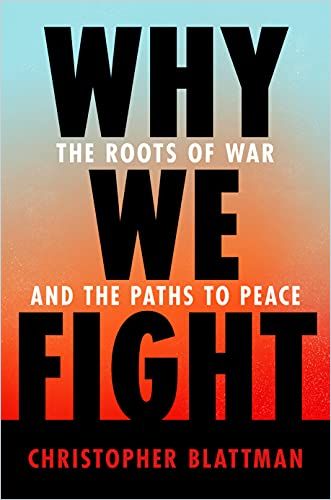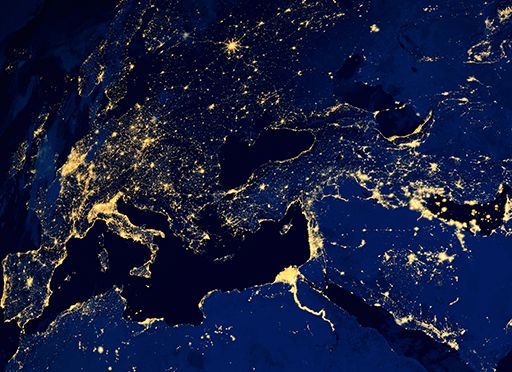Professor Christopher Blattman argues that thinking people prefer peace but that irrational concerns can spur war.

Avoiding War
Christopher Blattman — the Ramalee E. Pearson Professor of Global Conflict Studies at the University of Chicago — details the surprising survival of humanity despite ongoing war and ever more powerful weaponry. He convincingly explains that humans prefer compromising to fighting.
Negotiate or Don’t
Even when war seems an inevitable outcome, most adversaries seek peace. For example, consider two rival street gangs in Medellín, Colombia. The gang Pachelly had long held power, but their opponent, El Mesa, was gaining territory and recruiting soldiers. In a 2012 prison beef, rival gang members shot 23 prisoners and guards.
The globe is a patchwork of rival territories. Possessing them brings wealth, power, and status.Christopher Blattman
But no one died, and and no full-scale gang battle in Medellín erupted. The two sides compromised: Pachelly gave up turf, which satisfied El Mesa. When facing armed conflict, even lawless gangs set aside emotion and made strategic, long-term decisions. When both sides recognize that conflict will cost more than compromise, parties can create a “bargaining range” from which everyone can emerge with a portion of the “peace bonus.”
If decisions to fight were always logical, there would almost never be war. Tangible objectives, such as territory or spoils, form the conflict calculus. Societies and leaders often wage war over emotional factors, such as revenge, glory, or the pursuit of justice. These intangibles can skew negotiations. For example, Adolf Hitler sought to glorify the German people. When a nebulous goal such as glory becomes nonnegotiable, the bargaining range shrinks or disappears altogether.
In El Salvador’s civil war, impoverished rural citizens joined antigovernment guerrilla forces to gain dignity. For the oppressed, risking death through war seems preferable to subjugation.
For street gangs, uncertainty is a daily reality that fuels violence. Consider the case of Nap Dog, a rising lieutenant in Chicago’s Vice Lords in the 1980s. Nap Dog was goofing around with a fellow gang member when the young man accidentally shot Nap Dog in the thigh. Older Vice Lords told Nap Dog he had to retaliate. If he did not punish the shooter, they said, internal and external rivals would see him as weak and take advantage. Nap Dog publicly shot his friend in both thighs. In gang life, public revenge broadcasts strength and creates certainty in the minds of rivals about a gang member’s clout and ruthlessness.
The Natural State
Peace is the natural state of humankind. For example, competitive European nations avoided war for decades leading up to World War I in 1914. What changed? The “commitment problem” offers a useful explanation: If one party doesn’t trust its rivals to honor promises in the future, warlike leaders launch supposedly preventive wars. Germany perceived its two main rivals, France and Russia, as weak. Domestic proponents of war argued that these enemies imperiled Germany and that the time was right to attack.
Genocide is a tactic of the temporarily powerful.Christopher Blattman
Preventive war isn’t the only result of a commitment problem; when one side feels anxious about its future, genocide can ensue. In Rwanda, for example, the Hutu majority took bloody revenge on the civilian Tutsi minority after Tutsi soldiers launched a successful invasion in 1994. The genocide claimed almost one million lives in 100 days. The Hutu-controlled government felt so threatened about sharing power that it was willing to commit atrocities.
For much of human history, leaders could afford to miscalculate when going to war, because the very existence of humanity was not at risk. That changed with the advent of the atomic bomb. During the Cuban Missile Crisis of the early 1960s, for example, US President John F. Kennedy understood that rash action could lead to catastrophe.
In 1983, Soviet missile defense systems sounded the alarm about a purported American nuclear attack. A Soviet officer, acting on intuition that the alarm was a technical glitch, decided not to retaliate, and he saved the world from nuclear Armageddon. This demonstrates the importance of interdependence: When rivals share interests, they are less likely to wage war. Wars are bad for business.
Decentralized Power
Stable democracies embrace checks and balances. Fragile states, conversely, feature a dysfunctional centralization of power. In Liberia, for instance, nationalized decision making fostered a culture of violence. Voters didn’t elect mayors; the national president appointed them. Local governments couldn’t tax and spend; only the federal government in Monrovia could. Some thought centralized power would smooth over conflicts, but in reality, extreme centralization created a winner-take-all system, which attracted a dictator.
In fragile societies, a strong ruler becomes a liability. His or her whims rule the nation; war becomes more likely. When other branches of government check a leader’s power, and institutions – not individuals – make decisions, government power becomes less arbitrary and capricious.
The state as a pacifier is one of the oldest and most widely accepted ideas in history and social science.Christopher Blattman
Credible law enforcement helps keep the peace. In 19th-century Canada, for example, the government established the Mounties as a federal police force tasked with overseeing the prairies stretching from Manitoba to Alberta. A volatile mix of hunters, trappers, and indigenous peoples occupied the areas, and the Canadian government established frontier forts from which the Mounties patrolled. By establishing a clear federal presence, Canada colonized its western territories with remarkably little violence. The Mounties underscore the importance of neutral, third-party peacekeepers empowered to punish violent offenders.
Review
Christopher Blattman is a philosopher/historian with a keen eye for human motivation and a rare understanding of why people engage in bad, bloody courses of action. His fascinating read takes an incongruous position in this cynical age. Blattman argues that people are inherently nonviolent and would always prefer a peaceful solution. While he offers credible examples, he also provides plenty of moments of people behaving at their worst, their most vain, their most cynical, and their most short-sighted. Blattman’s unique view and staggering intelligence may fundamentally change your view of history.







